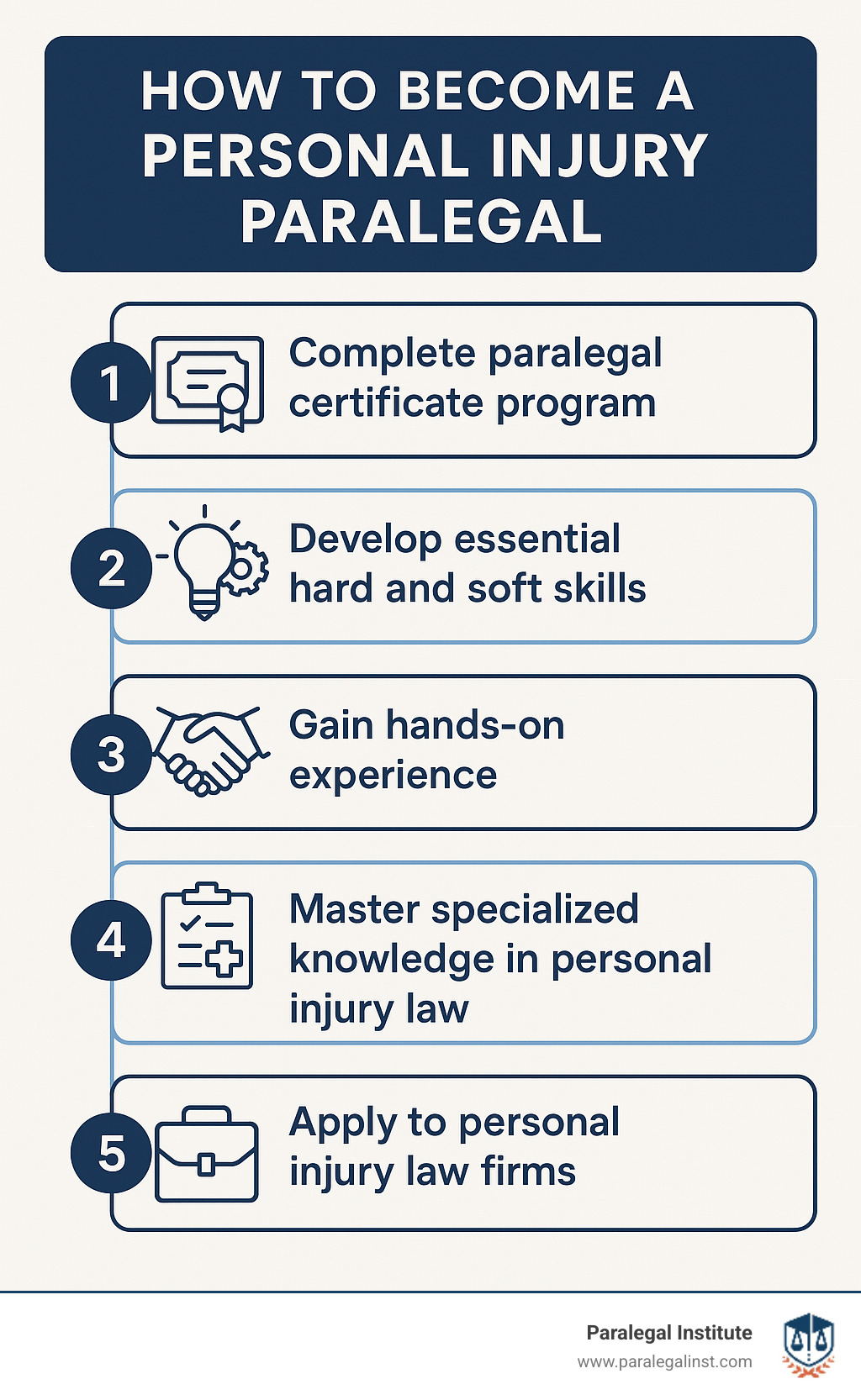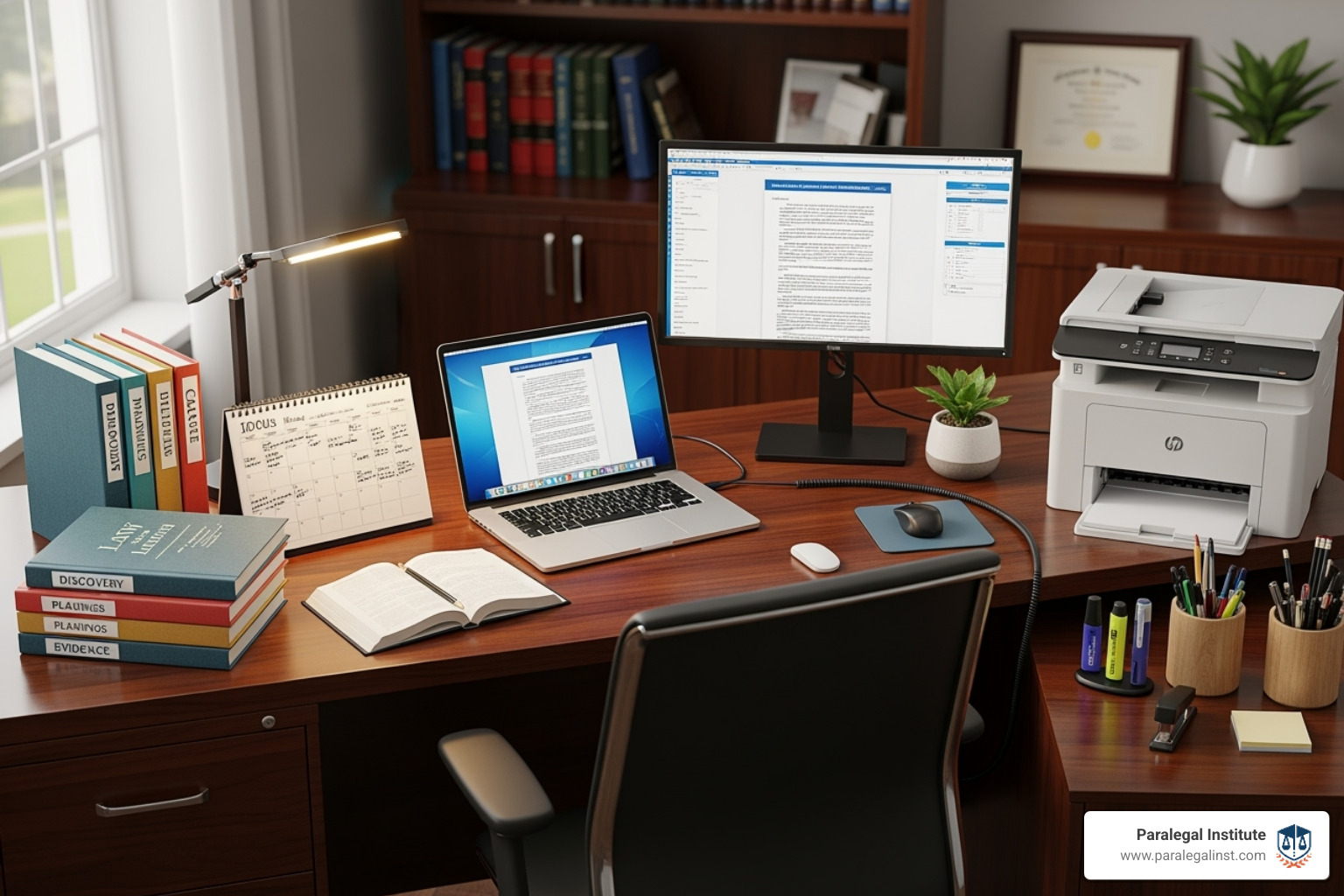Step-by-Step Guide to Launching Your Personal Injury Paralegal Career
Your Path to a Rewarding Legal Career
How to become a personal injury paralegal is a straightforward process that can launch you into a fulfilling legal career in just months, not years. As the backbone of law firms, personal injury paralegals provide crucial support to attorneys, manage high caseloads, and help injured clients steer complex legal processes.
Quick Answer: How to Become a Personal Injury Paralegal
- Complete a paralegal certificate program(15 week program with the Paralegal Institute)
- Develop essential skills including legal research, medical terminology, and client communication
- Gain practical experience through internships or entry-level positions
- Master specialized knowledge in tort law and medical records
- Launch your career by applying to personal injury law firms
This rewarding career offers the opportunity to make a real difference by helping accident victims secure fair compensation. Working alongside attorneys to build compelling cases, you can find diverse opportunities for growth on both the plaintiff side (representing injured parties) and the defendant side (working with insurance companies).
I'm Matthew Pfau, and I've spent years hiring and training paralegals at my personal injury law firm before founding Paralegal Institute. My experience in both practicing law and teaching aspiring paralegals has given me unique insights into how to become a personal injury paralegal successfully and what employers truly value.

Understanding the Role: What Does a Personal Injury Paralegal Actually Do?
If you're wondering how to become a personal injury paralegal, it helps to first understand what these legal professionals do. Personal injury paralegals are the backbone of law firms, working behind the scenes to support attorneys and serve as a lifeline for clients. While attorneys handle court appearances and legal advice, paralegals manage the intricate details of a case, often juggling 70+ active files at once.
Personal injury paralegals work on both the plaintiff side, helping injured people seek compensation, and the defendant side, assisting attorneys who defend against claims, often for insurance companies. The role also spans two phases: pre-litigation(before a lawsuit) and litigation(after a lawsuit is filed), offering a variety of career paths.
To learn more about the broader scope of paralegal work, check out our guide on the role of paralegals in law firms.
Key Responsibilities and Daily Tasks
Personal injury paralegals blend legal knowledge, administrative skill, and compassion. Their days are varied and demanding, requiring exceptional organization.

- Client Communication: Serving as the primary contact for clients, providing updates, answering questions, and offering reassurance with empathy and professionalism.
- Evidence Gathering and Document Drafting: Acting as legal detectives, they collect police reports, witness statements, and medical records. They then draft crucial documents like demand letters, which outline the client's case for settlement, and court filings.
- Medical Record Management: Requesting, reviewing, and summarizing complex medical records. This requires fluency in medical terminology to help attorneys understand the full scope of a client's injuries.
- Litigation Support and Deadline Tracking: Assisting attorneys with trial preparation by organizing exhibits and witness lists. One of their most critical duties is tracking statutes of limitation—the strict deadlines for filing lawsuits—to ensure no case is jeopardized.
- Scheduling and Logistics: Coordinating calendars for attorneys, clients, medical appointments, and court hearings, which requires masterful time management.
Where Personal Injury Paralegals Work
Opportunities for personal injury paralegals exist in several environments:
- Private Law Firms: The majority of personal injury paralegals work in law firms, which range from solo practices to large national firms. Smaller firms often provide broader experience, while larger firms may offer more specialized roles.
- Corporate Legal Departments: Companies facing significant liability, such as transportation or manufacturing businesses, hire paralegals for their in-house legal teams.
- Government Agencies: These roles involve cases related to public transportation, government property, or civil rights, and often provide excellent job security.
- Insurance Companies: Working on the defense side, these professionals (sometimes called claims specialists) evaluate claims and manage settlements.
The job market is consistently strong, as people will always need legal help after accidents. For insights into different firm environments, consider reading about choosing between a large and small law firm to help guide your career decisions.
How to Become a Personal Injury Paralegal: Your Action Plan
Launching your career as a personal injury paralegal involves three key steps: getting the right education, developing essential skills, and gaining practical experience. Here's your action plan.
Step 1: Get the Right Education with a Paralegal Certificate
While some paralegals learn on the job, modern law firms prefer candidates who can contribute from day one. A focused paralegal certificate program provides the practical skills employers need.
You'll learn tort law fundamentals, legal writing, and case management procedures specific to personal injury. Our 15-week paralegal certificate program at Paralegal Institute is designed by practicing legal professionals to give you the exact skills you need to succeed. The hands-on training prepares you for real law firm challenges, from drafting demand letters to tracking statutes of limitation.
Accelerated programs offer the fastest path to a new career, making you job-ready in months. Our program is available online and in-person at our Las Vegas location for maximum flexibility. You can learn more about paralegal certificate programs and explore our accelerated paralegal programs online.
Step 2: Develop the Essential Skills for Success
Success in this field requires a specific blend of hard and soft skills that you can develop through focused training.

- Hard Skills: These include legal research and writing, investigative techniques, and knowledge of medical terminology.
- Soft Skills: Excellent communication is vital for interacting with clients and insurance adjusters. Exceptional organizational skills and attention to detail are non-negotiable for managing high caseloads and critical deadlines. Finally, empathy is crucial for supporting clients through stressful and painful experiences.
Our training emphasizes building practical skills in paralegal training because we know these abilities are what separate good paralegals from great ones.
Step 3: Gain Practical Experience to Build Your Resume
Most law firms prefer to see some legal experience on a resume. Here’s how to get it:
- Internships: This is the most direct path to hands-on experience. Many certificate programs include internship opportunities, allowing you to apply your skills to real cases and build professional connections.
- Entry-Level Legal Support Roles: Starting as a legal assistant or file clerk gets your foot in the door. These positions help you learn firm procedures and can be a stepping stone to a paralegal role.
- Volunteer Work: Working with legal aid clinics demonstrates your commitment and helps you build practical skills while assisting real clients.
Getting your foot in the door is key. Once you're in a legal environment, your skills and work ethic can create opportunities for advancement. Explore paralegal internship opportunities and use our guide on how to get a paralegal job to land your first role.
Mastering the Craft: Specialized Knowledge for Personal Injury Paralegals
To truly excel as a personal injury paralegal, you must master two interconnected worlds: law and medicine. Developing specialized knowledge in these areas will make you invaluable to any law firm.
How to become a personal injury paralegal with crucial legal knowledge
Personal injury law is a part of tort law, which deals with civil wrongs that cause harm. Most cases are based on the negligence theory, which requires proving four elements: the defendant owed a duty of care, they breached that duty, the breach caused the client's injuries, and the client suffered actual damages.
Understanding legal procedures is also vital:
- Statutes of Limitation: These are the strict, non-negotiable deadlines for filing a lawsuit. Missing a deadline can destroy a case, so meticulous calendaring is essential.
- The Discovery Process: This is the formal exchange of evidence. You will help manage written discovery (like interrogatories) and prepare clients for depositions.
- Civil Procedure: A solid grasp of court rules and procedures for civil cases is necessary, especially with varying electronic filing requirements.
Strong case law research skills are crucial, as personal injury law relies heavily on precedent. Our legal research guide for paralegals can help you sharpen these skills.
How to become a personal injury paralegal with essential medical knowledge
In personal injury work, understanding the medicine is often as critical as understanding the law. Paralegals who can interpret medical information save attorneys valuable time and strengthen cases.

- Understanding Medical Records: You will obtain, review, and summarize complex records from hospitals and doctors, identifying details that can make or break a case.
- Medical Terminology: You must become fluent in medical language and abbreviations (e.g., "fx" for fracture, "dx" for diagnosis). This list of medical abbreviations is an invaluable reference.
- Common Injuries: Familiarity with injuries common in personal injury cases, from soft tissue damage to neurological issues like radiculopathy , helps you spot important details that others might miss.
This dual expertise in legal procedure and medical knowledge makes you the essential link that transforms complex medical facts into compelling legal arguments.
Advancing Your Career and Maximizing Your Potential
Once you've established yourself as a personal injury paralegal, the field offers incredible opportunities for professional and financial growth. There is always room to advance.
Salary Expectations and Earning Potential
Personal injury paralegals enjoy competitive compensation that reflects their specialized skills and high demand. While entry-level wages are solid, your earning potential grows significantly with experience.
Several factors influence pay. Experience is the biggest driver of salary growth, but firm size and geographic location also play crucial roles. Large firms in major cities often offer higher base salaries, while specialized skills in niche areas like medical malpractice can dramatically increase your earning power. When you make yourself indispensable, firms are willing to pay accordingly.
Beyond the paycheck, this career offers the satisfaction of helping injured clients. You can explore current national salary data for personal injury paralegals to get a sense of market rates.
Excelling and Advancing in Your Career
Standout paralegals actively seek ways to add more value. Continuous improvement is key to advancement.
- Continuing Education: Taking specialized courses keeps you ahead of the curve as the legal field evolves.
- Developing a Specialty: Focusing on a niche like medical malpractice or mass torts makes you more valuable and marketable.
- Networking: Building relationships through professional associations can lead to mentorship and job offers.
- Becoming a Problem-Solver: Proposing solutions to improve case management transforms you from a task-completer to a strategic partner.
- Mastering Technology: Proficiency in case management software and legal research databases gives you a significant competitive advantage.
At Paralegal Institute, we design our programs to build these advancement-focused skills. Learn more about enhancing paralegal career prospects with online education.
Frequently Asked Questions about a Personal Injury Paralegal Career
Starting a new career brings up many questions. Here are answers to the most common concerns about becoming a personal injury paralegal.
How long does it take to become a personal injury paralegal?
You can become a personal injury paralegal in months, not years. Accelerated paralegal certificate programs offer the fastest path into the workforce. For example, our 15-week program at Paralegal Institute is designed to make you job-ready quickly by focusing on the practical, hands-on skills that law firms require.
Is a career as a personal injury paralegal a good choice?
Absolutely. The field offers high demand and job security, along with the personal fulfillment of helping people through difficult times. It's a stable legal career that doesn't require law school, making it ideal for organized, empathetic individuals who want to make a real impact.
What is the most challenging part of the job?
The most challenging aspects are managing a high caseload (often 70+ files at once) and adhering to strict deadlines like statutes of limitation, where a mistake can jeopardize a client's case. The role also requires emotional intelligence to support clients who are injured and under stress. However, with the right training and organizational systems, these challenges are manageable and part of what makes the work so rewarding.
Conclusion: Take the First Step Today
Your journey to understanding how to become a personal injury paralegal has shown you a clear path: get the right education, develop crucial skills, and gain hands-on experience. This career is about more than just legal theory; it's about making a real difference in the lives of people who need help.
You can be the organized professional who keeps cases on track and the compassionate contact who helps clients steer a challenging time. You will be part of a team that fights for justice every day.
At Paralegal Institute, our 15-week paralegal certificate program is your bridge to this rewarding career. Our curriculum is designed by practicing legal professionals to give you the real-world skills you'll use from day one. Whether you choose our online program or join us in-person in Las Vegas, you're getting training that prepares you to contribute immediately.
The legal field needs skilled, compassionate paralegals. This career offers stability, growth, and the deep satisfaction of helping others. Don't wait to start your future. Take the first step and learn more about our legal support staff training. Your career as a personal injury paralegal starts today!










